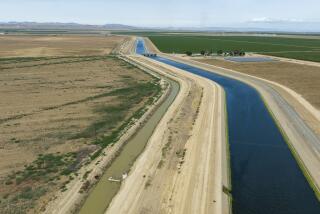No Panic on Drought, Wilson Says : Water: Governor names special task force to examine ‘all the options I can take.’ He declines to use emergency powers to direct allocations.
- Share via
SACRAMENTO — Counseling against panic, Gov. Pete Wilson moved Friday to take a more active role in managing the California drought but declined to trigger his emergency powers as long as there is enough water for “health and safety.”
Instead, the governor chose a middle ground by naming a special drought task force and directing it to report to him by Feb. 15 on “all the options I can take,” including the declaration of a drought emergency.
Despite pressure from customers of the state Water Project to take the extreme action, Wilson said invoking emergency powers would be similar to declaring “martial law” and would require stronger proof that local agencies were not adequately dealing with the crisis.
By using emergency powers, the governor could issue short-term orders that supersede state regulations, laws and bureaucratic actions. For example, Wilson could bypass water contracts held by farmers and cities and direct the allocation of water from the state Water Project, a major supplier for Southern California.
“Californians are worried and in some quarters that worry is turning into panic. Well, that should not be,” Wilson told a news conference. “Let me say it for all to hear: Concern is justified. Panic is not.”
Gesturing to a series of graphs illustrating the severity of a drought midway into its fifth year, the governor said he doubted the crisis would ever reach the point where it imperiled human life. He said, however, that it already poses a grave threat to “our livelihood.”
By naming a task force, Wilson was seen as taking a cautious, conservative approach to handling the drought. His action seemed to signal a willingness and authority to take charge while buying time to consider the options.
Wilson described the task force as “the central group to direct and coordinate state efforts to fight the drought.” He emphasized that it would “be under my direction.”
“I think it sounds to me pretty much like a holding action to give him a little more opportunity to figure out what makes most sense for a governor to do in a very critical period,” said Tom Graff, senior attorney for the Environmental Defense Fund. “After all, he’s a brand new governor. You have to give him a chance to figure out what’s going on.”
The governor insisted he was not attempting to override decisions of the state Water Resources Control Board--an independent panel that is considering emergency drought measures of its own--although if he does not agree with its decisions, he said, “I have the authority . . . to take jurisdiction.”
The four-member control board appointed by Wilson’s predecessor, former Gov. George Deukmejian, is scheduled to make a decision Feb. 7 on far-reaching proposals requiring such things as mandatory residential water rationing and reductions in water for farms.
Wilson appeared critical of both proposals, saying that water rationing was a procedure best handled by local agencies, although in the “worst-case scenario” it may be necessary to order it statewide.
Stressing that no segment of the economy should bear the brunt of the crisis, he said farmers should not be forced out of business so cities can receive abundant water. State Water Resources Department officials have said that, in accordance with contracts governing deliveries, they will deliver no water from the state Water Project to farmers this year if rainfall is normal or below normal through the spring.
“The question isn’t whether or not farms are going to cut down. They are going to cut down because they are compelled to already. The question is how far,” said Wilson.
In economic terms, Wilson said he and the Water Resources Control Board were faced with having to “play Solomon” with a precious commodity and essentially determine “how to distribute economic hardship.”
Unlike the Water Resources Department, which must adhere to contracts, the Water Resources Control Board--like the governor--has authority to overrule the department and place precise limits on state-controlled water that a household or a farm may use.
“We are determined that distribution of the burden will be achieved fairly,” the governor said.
Wilson named Water Resources Department Director David Kennedy to head the “drought action team,” a special panel of cabinet secretaries and agency chiefs that the governor appointed Friday. He also appointed Kennedy to continue as director of the department.
He said Kennedy’s appointment should be interpreted as an endorsement of the department director’s programs, particularly his efforts to provide for more reservoir storage. In a move that is expected to please water users and environmentalists, Wilson said he is also asking Kennedy’s department to develop a clearinghouse for water transfers--a procedure which permits agencies with more water to sell to agencies needing water.
Metropolitan Water District officials have said they hope to use water transfers to help make up for shortages in their deliveries from the State Water Project.
More to Read
Sign up for Essential California
The most important California stories and recommendations in your inbox every morning.
You may occasionally receive promotional content from the Los Angeles Times.













